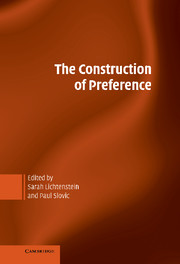Book contents
- Frontmatter
- Contents
- Contributors
- Preface
- Acknowledgments
- I INTRODUCTION
- II PREFERENCE REVERSALS
- III PSYCHOLOGICAL THEORIES OF PREFERENCE REVERSALS
- IV EVIDENCE FOR PREFERENCE CONSTRUCTION
- V THEORIES OF PREFERENCE CONSTRUCTION
- VI AFFECT AND REASON
- VII MISWANTING
- 27 New Challenges to the Rationality Assumption
- 28 Distinction Bias: Misprediction and Mischoice Due to Joint Evaluation
- 29 Lay Rationalism and Inconsistency Between Predicted Experience and Decision
- 30 Miswanting: Some Problems in the Forecasting of Future Affective States
- VIII CONTINGENT VALUATION
- IX PREFERENCE MANAGEMENT
- References
- Index
28 - Distinction Bias: Misprediction and Mischoice Due to Joint Evaluation
Published online by Cambridge University Press: 05 June 2012
- Frontmatter
- Contents
- Contributors
- Preface
- Acknowledgments
- I INTRODUCTION
- II PREFERENCE REVERSALS
- III PSYCHOLOGICAL THEORIES OF PREFERENCE REVERSALS
- IV EVIDENCE FOR PREFERENCE CONSTRUCTION
- V THEORIES OF PREFERENCE CONSTRUCTION
- VI AFFECT AND REASON
- VII MISWANTING
- 27 New Challenges to the Rationality Assumption
- 28 Distinction Bias: Misprediction and Mischoice Due to Joint Evaluation
- 29 Lay Rationalism and Inconsistency Between Predicted Experience and Decision
- 30 Miswanting: Some Problems in the Forecasting of Future Affective States
- VIII CONTINGENT VALUATION
- IX PREFERENCE MANAGEMENT
- References
- Index
Summary
Suppose that a person is faced with two job offers. She finds one job interesting and the other tedious. However, the interesting job will pay her only $60,000 a year, and the tedious job will pay her $70,000 a year. The person wants to choose the job that will give her the greatest overall happiness. To make that choice, she tries to predict the difference in happiness between earning $60,000 a year and earning $70,000 a year and also to predict the difference in happiness between doing the interesting job and doing the tedious job. Is she able to make these predictions accurately? Is she able to choose the job that will indeed bring her the greater overall happiness?
Consider another example. A person currently lives in a 3,000-square-foot (ft2) house that is within walking distance to work. He has the option to move to a 4,000-ft2 house for the same price as his current house, but if he moves there, it will take him an hour to drive to work every day. To decide whether to move, he tries to forecast the difference in happiness between living in the 3,000-ft2 house and living in the 4,000-ft2 house and also to forecast the difference in happiness between being able to walk to work and having to drive an hour to work. Is he able to make these predictions accurately? Is he able to make a decision that will give him the greater overall happiness?
- Type
- Chapter
- Information
- The Construction of Preference , pp. 504 - 531Publisher: Cambridge University PressPrint publication year: 2006



